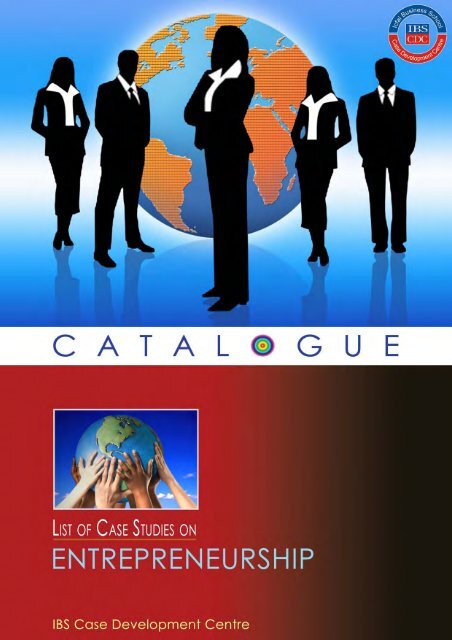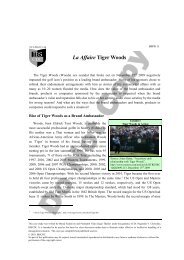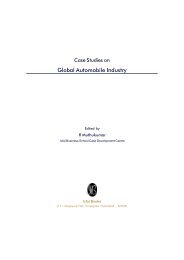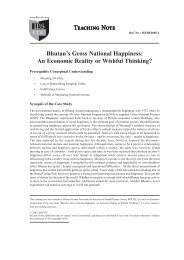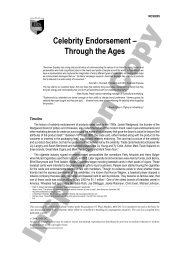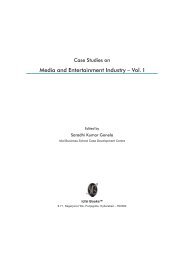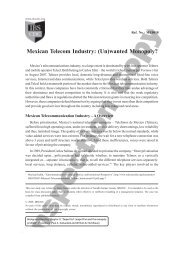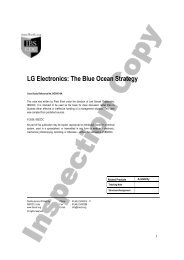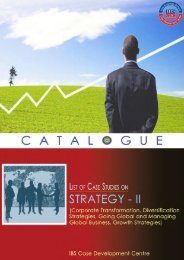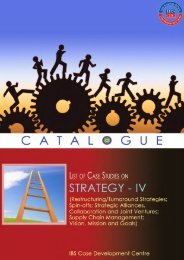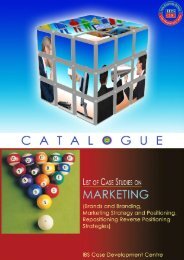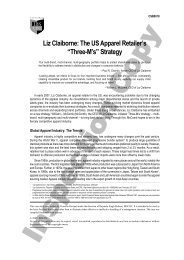Entrepreneurship Case Studies Catalogue
Entrepreneurship Case Studies Catalogue
Entrepreneurship Case Studies Catalogue
You also want an ePaper? Increase the reach of your titles
YUMPU automatically turns print PDFs into web optimized ePapers that Google loves.
www.ibscdc.org<br />
ENTREPRENEURSHIP<br />
ENTREPRENEURSHIP<br />
1
2<br />
Moser Baer, the Indian Optical<br />
Media Giant’s Technomarketing<br />
Strategies: Would the<br />
FMCG Way Pay Off?<br />
This case study enables an interesting<br />
discussion on how a technology company,<br />
whose business model was different from a<br />
FMCG company, started following the<br />
operating model of FMCG companies in<br />
its marketing strategies.<br />
Moser Baer, the first global Indian<br />
company, transformed itself into a multitechnology<br />
firm by adopting related<br />
diversification strategy. It entered the<br />
home entertainment sector through<br />
forward integration with its core<br />
competency in manufacturing CDs/DVDs.<br />
It adopted the FMCG model in marketing<br />
its products after foraying into the movie<br />
video segment. However, the big question<br />
is to what extent will the model adopted<br />
by Moser Baer in marketing pay off?<br />
Pedagogical Objectives:<br />
• To analyse Moser Baer's earlier business<br />
model in order to understand the<br />
organisational focus and organisational<br />
capabilities<br />
• To explore and debate on the relationship<br />
between the core competency of an<br />
organisation and its diversification<br />
(related) strategies<br />
• To debate on whether Moser Baer's<br />
diversification strategies would pay off<br />
given the impending challenges in<br />
marketing and distribution.<br />
Industry Computer Hardware<br />
Reference ENT0036<br />
Year of Pub. 2009<br />
Teaching Available<br />
Struc.Assign. Available<br />
Keywords<br />
Sales and distribution, Marketing strategies,<br />
Retailing, Core competency,<br />
Organisational capabilities, Low-cost,<br />
HUL, Related diversification, FMCG<br />
model, Moser Baer, Optical media storage,<br />
Home entertainment, Original Equipment<br />
Manufacturer, Home Video, Piracy<br />
Mahindra & Mahindra (B): An<br />
Emerging Global Giant?<br />
This case study is a sequel to Mahindra &<br />
Mahindra (A): Transformation of an<br />
Indian Family Business into a Globally<br />
Competitive Firm. This case study<br />
illustrates how companies from emerging<br />
markets like Mahindra & Mahindra<br />
(M&M) from India are competing globally<br />
by leveraging on their core competencies.<br />
Global companies, for a long time, came<br />
from developed countries. However, the<br />
scenario at present is changing as<br />
www.ibscdc.org<br />
companies from emerging markets are<br />
taking advantage of the resources of their<br />
home countries like low-cost labour, R&D<br />
capabilities, and a large pool of talented<br />
individuals. M&M has also capitalised on<br />
these resources and built globally<br />
competitive products in the automotive<br />
segment. The company exports its tractors<br />
to the US, China, Sri Lanka and Bangladesh.<br />
It is planning to export the company’s<br />
flagship product, 'Scorpio', to the US and<br />
Europe as well. The company’s future<br />
plans include entering into a variety of<br />
segments in the automotive segment using<br />
its R&D capabilities. Emerging-market<br />
companies like M&M, however, suffer<br />
from a few challenges like institutional<br />
voids, constant changes in consumer<br />
behaviour and lack of brand recognition,<br />
that test their ability to compete with<br />
global giants. Moreover, the low-cost model<br />
alone cannot always formulate a winning<br />
strategy. Will M&M be able to address<br />
these challenges and make a mark in the<br />
global automotive segment? Does it make<br />
sense for an emerging-market company<br />
like M&M to expand its product portfolio<br />
considering the challenges it is facing? Will<br />
M&M be able to manage its strategies for<br />
new products and new markets<br />
simultaneously?<br />
Pedagogical Objectives:<br />
• To analyse how 'emerging-market'<br />
companies are going global using unique<br />
strategies, leveraging on their acquired<br />
capabilities<br />
• To examine whether M&M would be<br />
successful in selling its SUV – Scorpio –<br />
in the land of SUVs, US<br />
• To explore various alternatives for<br />
M&M to build its brand globally.<br />
Industry Automobile Industry<br />
Reference ENT0035<br />
Year of Pub. 2009<br />
Teaching Available<br />
Struc.Assign. Available<br />
Keywords<br />
Going Global, Emerging Markets, Emerging<br />
Giants, Low Cost Countries, Building<br />
Brands, SUVs, Mahindra & Mahindra,<br />
International Expansion, Anand Mahindra,<br />
India Firms, India Inc<br />
Mahindra & Mahindra (A):<br />
Transformation of an Indian<br />
Family Business into a Globally<br />
Competitive Firm<br />
This case was written to illustrate the role<br />
of leadership in transforming an ageing<br />
family business into a formidable modern<br />
business player and is suitable for courses<br />
on managing family business and strategy.<br />
Anand G. Mahindra (Mahindra), vice<br />
chairman and managing director of<br />
Mahindra & Mahindra Ltd. (M&M) is<br />
credited for turning around his inherited<br />
family business into a highly focused,<br />
professionalised multinational firm<br />
operating in diversified business segments.<br />
He has transformed M&M from a farm<br />
equipment manufacturer into a Utility<br />
Vehicle (UV) manufacturer. By 2008,<br />
M&M was the market leader in the UV<br />
segment of India. Mahindra's strategies<br />
resulted in the creation of 'Scorpio' –<br />
M&M's Sports Utility Vehicle (SUV), which<br />
has been the company's claim to fame in<br />
the national and international arena. M&M<br />
is now venturing into all the segments of<br />
the automotive industry. However, it is<br />
debatable if Mahindra's strategies will be<br />
effective in sustaining a diverse product<br />
portfolio amidst increasing competition in<br />
India and abroad. While leadership<br />
contributed to the success of many family<br />
businesses, there were many others, which<br />
faded with time. Will M&M be able to<br />
continue its success streak?<br />
Pedagogical Objectives:<br />
• To study the dynamics of family<br />
businesses in India and to analyse the<br />
reasons behind the stagnation of many<br />
of them<br />
• To analyse the evolution of M&M and<br />
its transformation under the leadership<br />
of Anand G. Mahindra, from a farm<br />
equipment manufacturer into a UV<br />
manufacturer and a competitive multibusiness<br />
player<br />
• To explore and identify the new areas<br />
of growth for M&M.<br />
Industry Automobile Industry<br />
Reference ENT0034<br />
Year of Pub. 2009<br />
Teaching Available<br />
Struc.Assign. Available<br />
Keywords<br />
Family Business, Family Businesses, Indian<br />
Family Businesses, Mahindra & Mahindra,<br />
Anand Mahindra, SUVs, Scorpio,<br />
Leadership, Transformation, Turnaround,<br />
Keshub Mahindra, Mahindra Tractors<br />
Vijay Mallya, the Indian Business<br />
Baron: A ‘Bon Vivant’<br />
Entrepreneur?<br />
Indian business baron Vijay Mallya<br />
(Mallya), multibillionaire, Chairman of the<br />
Conglomerate- United Breweries Holdings<br />
(UB) is often referred to as the 'Branson<br />
of Bangalore'. Like Branson (the maverick<br />
entrepreneur behind the 'Virgin' Group),<br />
Mallya is known for his myriad interests,<br />
his flashy flamboyant style of leadership<br />
and his unorthodox style of management.<br />
Mallya's entrepreneurial style; his trade
acquisitions, etc., reveals sharp business<br />
acumen. Mallya currently (2007) reigns<br />
over a diverse portfolio of businesses -<br />
alcoholic beverages, life sciences, aviation,<br />
agriculture, chemicals, and information<br />
technology. The incredible prices paid for<br />
his prime acquisitions are also debated. Do<br />
they reflect business insight or<br />
impulsiveness? Considering how Mallya<br />
built up the UB Empire it is pertinent to<br />
assess the long-term vision that drives the<br />
maverick entrepreneur.<br />
Pedagogical Objectives:<br />
• To comprehend the concepts of<br />
leadership<br />
• To analyse various leadership styles<br />
• To probe into Personality traits of a<br />
successful entrepreneur<br />
• To analyse whether Personality traits<br />
affect the business decisions of an<br />
entrepreneur.<br />
Industry Business Conglomerate<br />
Reference ENT0033C<br />
Year of Pub. 2008<br />
Teaching Available<br />
Struc.Assign. Available<br />
Keywords<br />
Vijay Mallya; Flamboyant style; Kingfisher;<br />
UB group; Liquor baron; Airlines;<br />
Mcdowells; <strong>Entrepreneurship</strong> <strong>Case</strong> Study;<br />
White & Mackay; Leadership; Beer<br />
market; Brand Extension; Entrepreneur;<br />
Personality traits; Alcoholic beverages<br />
Technology and Business<br />
Incubation in India-Challenges<br />
and Opportunities<br />
University of California, San Francisco<br />
(UCSF), in its 130-year-old history, had<br />
traditionally served as a regional medical<br />
institution for training competent doctors<br />
to serve western USA. For years UCSF was<br />
considered to be an unlikely place for<br />
radical inventions. The scenario started<br />
changing from 1968 when collaborative<br />
approach to fundamental research started<br />
attracting some of the brightest scientific<br />
minds to UCSF. UCSF gave the world two<br />
of its largest Biotech companies,<br />
"Genentech" and " Chiron". By 2003,<br />
UCSF became a world leader in biomedical<br />
research with an annual budget of $1.9<br />
billion besides being the largest employer<br />
in SanFrancisco.<br />
Pedagogical Objectives:<br />
• Concepts of TBI and its presence in<br />
India<br />
• Entrepreneurial challenges in India<br />
• Indian scenario in promoting new<br />
entrepreneurs through incubation<br />
• Incubator-incubatee relationship.<br />
Industry <strong>Entrepreneurship</strong> Training<br />
Reference ENT0032C<br />
Year of Pub. 2007<br />
Teaching Available<br />
Struc.Assign.<br />
Keywords<br />
Not Available<br />
<strong>Entrepreneurship</strong> <strong>Case</strong> Study; Technology<br />
and Business Incubation; Business<br />
Incubation; Incubator; Incubatee;<br />
<strong>Entrepreneurship</strong>; <strong>Entrepreneurship</strong> in<br />
India; Seed Capital; Gestation Period;<br />
Incubators in India; Innovation<br />
Management; Venture Capital; Technology<br />
transfer; Business strategies; Spin-offs;<br />
Business Plan<br />
The Body Shop (A): Anita<br />
Roddick’s Green Brand?<br />
The Body Shop was the leading ethical<br />
cosmetics retailer in the UK. In 1999, it<br />
was voted the second most trusted brand in<br />
the UK by the Consumers Association. In<br />
2004, it was selling ethically manufactured<br />
and sourced cosmetics, through 2000 stores<br />
across 50 countries with annual sales of<br />
£700 million.<br />
The Body Shop was founded by Anita<br />
Roddick (Anita) in 1976 with a single shop<br />
selling about 15 hand mixed products. She<br />
opened the first shop in Brighton, Sussex,<br />
as a means of supporting herself and her<br />
children. Anita’s deep passion for human<br />
rights and environmental issues affected<br />
the way she ran her company and sourced<br />
her products. Soon, over the next three<br />
decades, the Body Shop grew into a global<br />
network selling more than 500 products.<br />
Her company introduced the benefits of<br />
natural ingredients such as jojoba oil, aloe<br />
vera, rhassoul mud and cocoa butter, which<br />
were hitherto unheard of in the cosmetic<br />
world.<br />
But in the mid 1990s, the glory of the<br />
‘green’ brand faded with accusations about<br />
the Body Shop concept being stolen from<br />
the US, its product claims that it contained<br />
natural ingredients and problems with its<br />
franchises. By 2004, the Body Shop was<br />
facing declining sales in its home market.<br />
The brand was losing its luster in a market<br />
that was flooded with competitors offering<br />
similar products at a much lower cost. A<br />
majority of the Body Shop’s outlets were<br />
owned by franchisees which left the<br />
company dependent on their performance.<br />
Pedagogical Objectives<br />
• To discuss Anita Roddick’s<br />
entrepreneurial efforts<br />
• To discuss Anita’s strategy of promoting<br />
a brand on an ethical/corporate<br />
reputation strategy.<br />
Industry Personal Care Products<br />
Reference ENT0031C<br />
Year of Pub. 2006<br />
Teaching Note Available<br />
Struc.Assign. Not Available<br />
Keywords<br />
Natural Cosmetics; Ethical Marketing;<br />
Corporate Social Responsibility; Anita<br />
Roddick; The Body Shop; Personal care<br />
products; community trade; ethical<br />
cosmetic retailer; Beauty Care Market;<br />
human rights; environmental issues; animal<br />
testing; entrepreneurship; franchises.<br />
Nike’s Knight in Shining Armour<br />
Nike, one of the world’s largest sportswear<br />
manufacturers, had very humble<br />
beginnings. But propelled by the vision and<br />
energy of its founder, Philip Knight, the<br />
company attained iconic status among the<br />
global youth. With Knight finally retiring<br />
from the helm of Nike and the new CEO,<br />
William Perez, being perceived as an<br />
‘outsider’ to the industry, Nike faced a new<br />
twist in its history.<br />
This case highlights the entrepreneurial<br />
abilities of Philip Knight and talks of how<br />
he was responsible for creating one of the<br />
most well known businesses in the world.<br />
It can be used to discuss the potential fate<br />
of a company, till now driven by a single<br />
individual, suddenly handed over to a new<br />
leader.<br />
Pedagogical Objective<br />
• To understand the plight of a company<br />
driven by a new leader.<br />
Industry Footwear<br />
Reference No. ENT0030B<br />
Year of Pub. 2005<br />
Teaching Note Not Available<br />
Struc.Assig.<br />
keywords<br />
Not Available<br />
Nike; Phil Knight; Air Jordan; Nike's<br />
growth; Knight's leadership; Just do it;<br />
William Perez; Reuse-a-shoe; R & D at<br />
Nike; Nike Marketing; Wireless<br />
communication; Mobile messaging<br />
systems; Intellisync; Non-voice mobile<br />
services; SEVEN.<br />
Martha Stewart: The Rise of the<br />
Phoenix?<br />
The case is about Martha Stewart, the queen<br />
of home improvement in the US. The case<br />
highlights the emergence of Martha Stewart<br />
as an entrepreneur and the establishment<br />
of her company in the late 1990s. The<br />
case also outlines the decline of the ‘Martha<br />
Stewart’ brand and the subsequent fall in<br />
revenues of her company, Martha Stewart<br />
Living Omnimedia after she was indicted<br />
www.ibscdc.org<br />
ENTREPRENEURSHIP<br />
ENTREPRENEURSHIP<br />
3
4<br />
in the Imclone stock scandal. After serving<br />
the sentence in 2005, Martha made a<br />
comeback with TV shows, a self-authored<br />
book, and a radio show among several<br />
others of her comeback plans. But it is felt<br />
that the comeback is not making an effect<br />
on the company’s revenues. The case tries<br />
to analyze answers for two main issues-<br />
Will the elaborate comeback strategy of<br />
Martha Stewart have an effect on the<br />
company? Can the company reach the<br />
peak it had fallen from?<br />
Pedagogical Objectives<br />
• To understand the entrepreneurial skills<br />
• To analyze the pros and cons of<br />
associating<br />
entrepreneur<br />
products with the<br />
• To study whether the comeback plans<br />
of Martha Stewart will translate into<br />
increasing sales and growth for her<br />
company<br />
• To analyse whether Martha Stewart’s<br />
company, MSLO will regain its footing<br />
in the US market.<br />
Industry Services/Publishing<br />
Periodicals<br />
Reference No. ENT0029B<br />
Year of Pub. 2005<br />
Teaching Note Not Available<br />
Struc.Assig. Not Available<br />
keywords<br />
Martha Stewart; MSLO; Entreprenuer;<br />
ImClone Systems;The Apprentice; Martha<br />
Stewaart Living Omnimedia; Comeback;<br />
ImClone scandal; Insider Decline; Home<br />
Improvwement; Donald Trump;<br />
Publishing; Rise.<br />
Laxmi Nivas Mittal: Obscurity to<br />
Oplulence<br />
In his 16-year rise from obscurity to<br />
opulence, Lakshmi Niwas Mittal multiplied<br />
his steel holdings by 138 times. He is<br />
known mostly for his unique collection of<br />
steel mills in such countries as Trinidad<br />
and Tobago, Kazakhstan, and Mexico. He<br />
started right from scratch in the year 1989<br />
and by 2006, he is the biggest steelmaker<br />
on the globe and held a dominant position<br />
in the US, employing 224,000 people<br />
spanning 49 different nationalities.<br />
Mittal is a business tycoon who virtually<br />
came from nowhere, only to emerge as<br />
the world’s largest steelmaker. He is world’s<br />
richest Indian, and he was not at<br />
allembarrassed displaying his wealth. After<br />
acquiring steel plants all over the world,<br />
Laxmi Niwas Mittal seems all set to prove<br />
his ‘Theory of Consolidation and<br />
Sustainability’ in the near future to come<br />
www.ibscdc.org<br />
Pedagogical Objective<br />
• To study the making of a business tycoon<br />
– the strategies adopted by Mittal to<br />
become the world’s largest steelmaker.<br />
Industry Steel<br />
Reference No. ENT0028B<br />
Year of Pub. 2006<br />
Teaching Note Not Available<br />
Struc.Assig. Not Available<br />
keywords<br />
Mittal Steel; producer; Acquisition;<br />
Mergers; opulence; Direct Reduced Iron<br />
(DR); CONSOLIDATIONS; Karmet Steel;<br />
Marwari Ispat Steel; India; Arcelor;<br />
London; Laxmi Nivas Mittal;<br />
sustainability.<br />
Vikram Akula’s SKS Microfinance<br />
Pvt. Ltd.: The Making of a<br />
Successful Microfinance<br />
Institution<br />
Vikram Akula set up SKS Microfinance Pvt.<br />
Ltd. (SKS) in 1998 to provide microfinance<br />
to the poorest sections of the Indian society<br />
that earns a per capita less than INR 6,000<br />
($120) per year. Negating the traditional<br />
assumption that microcredit is not a viable<br />
business in developing countries, SKS has<br />
brought in a new microfinancing model in<br />
India, which is profitable and selfsustaining.<br />
By reducing costs through<br />
prevention of wastage at each step of the<br />
loan process coupled with innovative<br />
technologies and an efficient management<br />
system, Akula has transformed SKS into<br />
one of the fastest growing microfinance<br />
institutions in the world. By attracting<br />
capital from global financial institutions<br />
like Citibank and through its automated<br />
MIS system and its award winning<br />
SmartCards Pilot Project, SKS aims to grow<br />
at 400% per annum in the future.<br />
Pedagogical Objectives<br />
• To understand the concept of<br />
microfinancing and its need in a<br />
developing economy like India<br />
• To analyse the role of innovative<br />
technologies in the growth of social<br />
ventures<br />
• To debate on the self-sustainability and<br />
future growth prospects of SKS in India.<br />
Industry Social Enterprise<br />
Reference No. ENT0027<br />
Year of Pub. 2006<br />
Teaching Note Not Available<br />
Struc.Assig. Not Available<br />
keywords<br />
Vikram Akula; Micro Financing;<br />
Technology in Micro Financing; Social<br />
<strong>Entrepreneurship</strong>; SmartCard Project;<br />
Microfinance in India; Microfinance<br />
Methodology; IT systems in Microfinance;<br />
Microfinance MIS; Social<br />
<strong>Entrepreneurship</strong>; Grameen Model;<br />
Microfinance Models; Micro Finance<br />
Institutions; Non-Government<br />
Organisations.<br />
Global Hospitals – Where Life<br />
Gets a Second Chance<br />
Global Hospitals has carved a niche for<br />
itself as a referral hospital in India by<br />
offering specialised services in<br />
gastroenterology and organ<br />
transplantation. Being a visionary, Dr.<br />
Kancherla Ravindranath has further plans<br />
to offer super-specialty and paramedical<br />
courses to doctors and the paramedical staff<br />
to fill the current gap of professionally<br />
trained personnel in the medical field. He<br />
is also fanatical about expanding to major<br />
metros and secondary towns of India and<br />
eventually foray into Asian countries.<br />
However, with minor hitches in operational<br />
aspects that any hospital, in general,<br />
encounters and lack of availability of worldclass<br />
professionals at the paramedical level,<br />
Global Hospitals has a long way to go before<br />
making its presence felt in other parts of<br />
the country and abroad. The main subjects<br />
for analysis and discussions in this case<br />
include the vision and entrepreneurship of<br />
Dr. Ravindranath, the successful journey<br />
of Global Hospitals, its corporate social<br />
responsibility activities, employee<br />
relations, business strategy.<br />
Pedagogical Objectives<br />
• To discuss Global Hospitals’ corporate<br />
social responsibility activities, employee<br />
relations, business strategy<br />
• To debate on the entrepreneurship style<br />
of Dr. Ravindranath.<br />
Industry Healthcare industry<br />
Reference No. ENT0026<br />
Year of Pub. 2006<br />
Teaching Note Not Available<br />
Struc.Assig. Not Available<br />
keywords<br />
Dr Kancherla Ravindranath; Global;<br />
Transplantation; Paramedical;<br />
Gastroenterology; Hospital; Affordability;<br />
Accessibility; Laparoscopic; Multi-organ;<br />
Social responsibility; Mission; vision;<br />
Hospital services; Infection; Professional.<br />
StreetShine, UK’s Social<br />
Enterprise: Making the Business<br />
to make a Difference<br />
Street Shine was founded in early-2004 by<br />
Nick Grant as a social enterprise to provide<br />
employment to the homeless in London.<br />
It has formed an alliance with 23 offices<br />
and one hotel in London to provide the
shoe-shining service. However, as it plans<br />
to become a self-sustained business by<br />
2007, it is facing certain challenges that<br />
are commonly encountered by social<br />
enterprises, especially if they are in the<br />
business of shoe shining, which is<br />
considered to be demeaning by many.<br />
Pedagogical Objectives<br />
• To understand the factors that led to<br />
the genesis of social enterprises and<br />
social entrepreneurship<br />
• To analyse the need for and the impact<br />
of social enterprises on society<br />
• To discuss the business model of<br />
StreetShine and debate whether it can<br />
become a self-sustained enterprise in the<br />
near future.<br />
Industry Not Applicable<br />
Reference No. ENT0025<br />
Year of Pub. 2006<br />
Teaching Note Not Available<br />
Struc.Assig. Not Available<br />
keywords<br />
Nick Grant; Definition of social<br />
entrepreneurship; Social entrepreneurship<br />
life cycle; Social enterprise; Social<br />
entrepreneurship; Shoe-shining; Nongovernment<br />
organisations; Ashoka Fellows;<br />
A glimmer of hope; Mohammed Yunus;<br />
Bangladesh Grameen Bank; Bill Drayton.<br />
Bill Drayton’s ‘Ashoka’: The<br />
Social Entrepreneur’s ‘Social<br />
Enterprise’<br />
Transformation in global society took place<br />
after the Industrial Revolution of UK in<br />
1700. The Industrial Revolution divided the<br />
society into two unequal sectors – business<br />
and social. While the business sector grew<br />
at a rapid rate, the other half of the society<br />
lagged behind. However, the situation began<br />
to change slowly when from 1980 the social<br />
entrepreneurship concept began to become<br />
popular. Bill Drayton (Drayton), the<br />
founder of Ashoka, was the person primarily<br />
responsible for the popularisation of the<br />
concept of social entrepreneurship. He<br />
established Ashoka in 1980 to support<br />
individuals involved in this field of social<br />
entrepreneurship. The enterprise first seeks<br />
to find out leading social entrepreneurs<br />
across the world, who are then provided<br />
financial support to assist in their mission<br />
to solve social problems. These members<br />
are responsible for bringing major social<br />
changes in their respective fields.<br />
Pedagogical Objectives<br />
• To discuss the negligence of social sector<br />
after the Industrial Revolution<br />
• To discuss the changes that took place<br />
in the social sector from the year 1980<br />
• To understand Ashoka’s model of social<br />
development and Bill Drayton’s efforts<br />
to provide a fillip to the social sector<br />
• To debate the sustainability of social<br />
entrepreneurship.<br />
Industry Social <strong>Entrepreneurship</strong><br />
Reference No. ENT0024<br />
Year of Pub. 2006<br />
Teaching Note Not Available<br />
Struc.Assig. Not Available<br />
keywords<br />
Social enterprise; Social entrepreneurship;<br />
Business sector; Social sector; Ashoka; Bill<br />
Drayton; Social achievements; Ashoka<br />
Fellows; Social changes; Change maker.<br />
Patrick J. McGovern’s<br />
International Data Group:<br />
Growth Strategies in Asia<br />
With constant focus on identifying newer<br />
markets and opportunities, Patrick J.<br />
McGovern (McGovern), the founder of<br />
International Data Group (IDG), has<br />
transformed his company as the leading<br />
provider of research and publication on<br />
technology and media in the world. One of<br />
the earliest publishing companies from the<br />
US to foray into Asia, IDG has been the<br />
first US publisher to enter China in 1980.<br />
The growth potential of the Asian market<br />
has placed Asia at the center of IDG's future<br />
growth strategies as McGovern estimates<br />
that China would be the largest contributor<br />
to its revenue by 2020. The case, while<br />
describing the inception, growth and<br />
products of IDG, especially in Asian<br />
countries, offers scope to discuss the entry<br />
and growth opportunities in emerging<br />
economies.<br />
Pedagogical Objectives<br />
• To understand the entrepreneurial and<br />
leadership strategies of Patrick J.<br />
McGovern and how he expanded his<br />
business empire through his business<br />
vision and the knack to spot new<br />
markets and opportunities<br />
• To analyse the critical success factors in<br />
the global online publishing industry<br />
• To debate the efficacy of IDG’s growth<br />
strategies in Asia, especially in the light<br />
of rampant piracy and poor intellectual<br />
property track record of China.<br />
Industry Periodicals Publishing<br />
Reference No. ENT0023<br />
Year of Pub. 2006<br />
Teaching Note Not Available<br />
Struc.Assig. Not Available<br />
keywords<br />
Patrick J McGovern; International Data<br />
Group (IDG); International Data<br />
Corporation (IDC); Growth strategies in<br />
Asia; IDG's product profile; IDG's corporate<br />
culture; IDG in China; Computerworld;<br />
Growth of International Data Group; IDG<br />
in Asia.<br />
Wilbur Ross: The Buyout King<br />
After his MBA from Harvard, and as an<br />
executive at Rothschild Inc. for 25 years,<br />
Wilbur Ross has been a financial adviser to<br />
creditors and stockholders of bankrupt<br />
companies like Texaco, Eastern Airlines<br />
and Ling-Temco-Vought (LTV) steel. In<br />
1998, Fortune magazine named Wilbur<br />
Ross as the ‘King of Bankruptcy’. In 2000,<br />
Ross established his own private equity<br />
company, WL Ross & Co. By late 2005,<br />
Ross was involved in the restructuring of<br />
$200 billion worth of defaulted companies’<br />
assets across the world.<br />
Pedagogical Objectives<br />
• To understand the entrepreneurial zeal<br />
of Wilbur Ross<br />
• To discuss how the English literature<br />
graduate became one of the best-known<br />
turnaround financiers in the US.<br />
Industry Investment Firm<br />
Reference No. ENT0022<br />
Year of Pub. 2006<br />
Teaching Note Not Available<br />
Struc.Assig. Not Available<br />
keywords<br />
Turnaround financiers in the US; Rothschild<br />
Inc; Early life of Wilbur Ross; Wilbur Ross<br />
as an entrepreneur; Bankruptcy<br />
restructurings by Wilbur Ross; Sectors in<br />
which Wilbur Ross operates; International<br />
Steel Group; Strategy to turnaround<br />
bankrupt companies.<br />
Pete Kight’s CheckFree:<br />
Pioneering Online Bill Payments<br />
in the US<br />
Since the 1990s, e-commerce has<br />
transformed tangible money into a piece<br />
of information, which can drive the<br />
finances of the corporate world through<br />
the click of a mouse. Pete Kight captured<br />
this opportunity to pioneer a system to<br />
provide Electronic Bill Payment and<br />
Presentment (EBPP) services to his<br />
customers. He removed the hassles of<br />
writing cheques, paste envelops and<br />
postage for paying bills by establishing<br />
CheckFree in 1981. CheckFree is an online<br />
service provider for e-commerce and<br />
payment services, which became the biggest<br />
player in the industry by 1993. In 2004-<br />
2005, CheckFree had annual sales of $757<br />
million.<br />
www.ibscdc.org<br />
ENTREPRENEURSHIP<br />
ENTREPRENEURSHIP<br />
5
6<br />
Pedagogical Objectives<br />
• To understand the entrepreneurial zeal<br />
of Pete Kight to establish CheckFree<br />
• To discuss how CheckFree had been<br />
instrumental in spawning the global<br />
electronic bill payment and presentment<br />
industry.<br />
Industry Transaction Processing and<br />
Settlement<br />
Reference No. ENT0021<br />
Year of Pub. 2006<br />
Teaching Note Available<br />
Struc.Assig. Not Available<br />
keywords<br />
Electronic bill payment and presentment;<br />
e-Payments; Mastercard; On-line banking<br />
services; UIL Holdings Corporation;<br />
Aphelion Inc; Fitness software provider;<br />
Electronic commerce services; Bank of<br />
America; First electronic bill payment<br />
system; 2005 Entrepreneur of the year;<br />
Leading EBPP (electronic bill payment and<br />
presentment) firms in US; Attention<br />
Deficit Disorder (ADD).<br />
Berkshire Hathaway Inc.: Warren<br />
Buffet’s Investment Philosophy<br />
Warren Buffet, the world’s most successful<br />
investor and the second richest man after<br />
Bill Gates, was born on August 30 th 1930<br />
at Omaha, Nebraska, USA. Buffet,<br />
popularly known as the ‘Oracle of Omaha’<br />
had made his first investment in shares<br />
when he was only eleven years old. In<br />
1962, he began purchasing the shares of<br />
Berkshire Hathaway, a textile<br />
manufacturing firm at New Bedford. By<br />
1965, he acquired Berkshire by purchasing<br />
the majority of its shares and then declared<br />
himself as the company’s Director. He<br />
started investing and acquiring other<br />
companies through Berkshire, and soon<br />
transformed Berkshire into an investmentmaking<br />
firm. He employed the investment<br />
strategy of identifying undervalued<br />
companies, those having high-growth<br />
potential and a good management, which<br />
could produce high returns in the long run.<br />
He was a value investor and believed that<br />
the short-term fluctuations of the stock<br />
market would not affect his investment<br />
decisions. His investment approach helped<br />
Berkshire to earn substantial stakes in<br />
Coca-Cola Co., Wells Fargo Co., and<br />
American Express. Most of the Berkshire<br />
investments were made in the insurance<br />
and retailing sectors.<br />
Pedagogical Objective<br />
• To discuss the investment philosophies<br />
of Warren Buffet and debate on his<br />
business philosophies that led Berkshire<br />
to outpace the Dow Jones Industrial<br />
Average for more than 40 years.<br />
www.ibscdc.org<br />
Industry Financial Services<br />
Reference No. ENT0020<br />
Year of Pub. 2006<br />
Teaching Note Not Available<br />
Struc.Assig. Not Available<br />
keywords<br />
Warren Buffet; Berkshire Hathaway Inc;<br />
Benjamin Graham; Investment<br />
philosophy; Wall Street; Buffet Associates<br />
Ltd; Buffet Partnerships; Insurance<br />
business; GEICO (General Employees<br />
Insurance Company); Competition;<br />
Shares;<br />
principles.<br />
Stock market; Investment<br />
Philip F. Anschutz: Entrepreneur<br />
with a ‘Contrarian Strategy’<br />
Philip F. Anschutz (Anschutz), one of the<br />
richest American businessmen acquired<br />
stakes in more than 100 underperforming<br />
businesses and successfully restructured<br />
them into profitable entities. He built one<br />
of the largest theatre chains in the US, the<br />
Regal Entertainment Group and also<br />
flourished in the telecommunications<br />
business through Qwest. Anschutz’s flair<br />
for betting on underperforming businesses<br />
had earned him the recognition as an<br />
entrepreneur with a ‘contrarian strategy’.<br />
However, Anschutz faced setbacks when<br />
an accounting scandal forced him to quit<br />
from the Non-Executive Chairman post<br />
in Qwest. Analysts opined that his latest<br />
venture into newspaper business was also a<br />
challenge considering the strong<br />
competition from The Washington Post.<br />
Pedagogical Objectives<br />
• To understand the strategies followed by<br />
Anschutz to become one of America’s<br />
richest and successful entrepreneurs<br />
• To understand and analyse Anschutz’s<br />
‘contrarian strategy’.<br />
Industry Not Available<br />
Reference No. ENT0019<br />
Year of Pub. 2005<br />
Teaching Note Not Available<br />
Struc.Assig. Not Available<br />
keywords<br />
Philip F Anschutz; Contrarian strategy;<br />
<strong>Entrepreneurship</strong>; Oil exploration; Largest<br />
theatre chain in the US; Entry into<br />
newspaper business; Risk taking ability;<br />
Turning around loss making businesses;<br />
Strategy and general management.<br />
Lakshmi Niwas Mittal –<br />
Spearheading Consolidation in<br />
the Global Steel Industry<br />
Lakshmi Niwas Mittal, also called the<br />
‘Carnegie of Steel’, built his steel empire<br />
by aggressively acquiring poorly<br />
performing steel plants at low prices in<br />
places like Trinidad & Tobago, Kazakhstan,<br />
Romania, Germany, Poland, Canada and<br />
America and turning them around into<br />
money-spinners. He is considered to be an<br />
industry visionary, spotting trends much<br />
before his contemporaries and investing<br />
accordingly. In October 2004, Mittal<br />
announced that LNM would be acquiring<br />
International Steel Group of the US for<br />
$4.5 billion. If regulatory authorities<br />
approve, this could make the combined<br />
entity, named Mittal Steel the largest<br />
producer of steel in the world, surpassing<br />
the current world leader, Arcelor.<br />
Pedagogical Objectives<br />
• To discuss the impact, this proposed<br />
acquisition would have on the global steel<br />
industry<br />
• To discuss the current and future levels<br />
of consolidation in global steel and the<br />
risks that companies like LNM would<br />
encounter<br />
• To discuss the ‘demand from China’<br />
factor which is further driving<br />
consolidations in the steel sector.<br />
Industry Steel<br />
Reference No. ENT0018<br />
Year of Pub. 2005<br />
Teaching Note Not Available<br />
Struc.Assig. Not Available<br />
keywords<br />
Lakshmi Niwas Mittal; LNM Holdings;<br />
Mittal Steel; International steel group;<br />
Global steel industry; Consolidation in the<br />
steel industry; China's demand for steel;<br />
Direct reduced iron; LNM's acquisition<br />
strategy; Wilbur Ross Jr; Raw material<br />
prices in the steel industry.<br />
Bloomberg’s Growth: The<br />
Michael Bloomberg Factor<br />
In the early 1980s, after being fired from<br />
Salomon Brothers Inc., Michael Rubens<br />
Bloomberg invested his $10 million<br />
partnership pay-out to start his own<br />
company, Bloomberg LP. By the late<br />
1990s, Bloomberg had emerged as a strong<br />
player in the market data industry and<br />
began to make dents in the market share<br />
of its competitors like Reuters, Bridge and<br />
Dow Jones. The success of Bloomberg was<br />
attributed to the innovative strategies of<br />
Michael Bloomberg. But, in November<br />
2001, when Michael Bloomberg left<br />
Bloomberg to become New York City<br />
Mayor, there were doubts regarding the<br />
future prospects of the company.<br />
Pedagogical Objectives<br />
• To discuss the initiatives taken by<br />
Michael Bloomberg in order to
transform his company from an upstart<br />
into a media and financial-data giant<br />
• To discuss whether the departure of<br />
Michael Bloomberg who played an<br />
instrumental role in the company’s<br />
growth, would hamper its prospects.<br />
Industry Information Collection and<br />
Delivery<br />
Reference No. ENT0017<br />
Year of Pub. 2004<br />
Teaching Note Not Available<br />
Struc.Assig. Not Available<br />
keywords<br />
Bloomberg; Michael Bloomberg; Salomon<br />
Brothers; Merrill Lynch; Reuters;<br />
Terminals; Bloomberg Professional service;<br />
Bloomberg news; Bloomberg business radio;<br />
Bloomberg television; Bloomberg<br />
magazine; Thomson Financial; New York<br />
City Mayor; Matthew Winkler; Jonathan<br />
Fram.<br />
Aravind Eye Hospitals: A <strong>Case</strong> in<br />
Social <strong>Entrepreneurship</strong><br />
Aravind eye hospitals, (a $11 million<br />
venture) based in Madurai, India, is one of<br />
the largest eye hospitals in the world, and<br />
in terms of scale, the single largest provider<br />
of eye surgeries. Started as an 11-bed<br />
hospital by Dr. G. Venkataswamy, the<br />
Aravind conglomerate now consists of<br />
hospitals, an intraocular lens manufacturing<br />
unit and community development and<br />
research institutes. Though two-thirds of<br />
the surgeries are performed free of charge,<br />
Aravind is financially self-sufficient. A high<br />
level of efficiency in all its activities is<br />
seen as one of the secrets behind Aravind's<br />
success.<br />
Pedagogical Objectives<br />
• To discuss how firms, especially in<br />
developing countries, with a low capital<br />
base can sustain themselves through<br />
streamlined operations and a focused<br />
approach towards growth<br />
• To discuss ‘Aravind as a role model for<br />
businesses’ that serve the ‘bottom of the<br />
pyramid’, as pointed by Professor C K<br />
Prahalad.<br />
Industry Health Care<br />
Reference No. ENT0016<br />
Year of Pub. 2004<br />
Teaching Note Available<br />
Struc.Assig. Not Available<br />
keywords<br />
Aravind eye hospitals; Dr Govindappa<br />
Venkataswamy; Efficient in operations;<br />
Curable blindness; Cataract; Bottom of the<br />
pyramid; Developing countries; Intraocular<br />
lens; Aurolab; Community development;<br />
Eye camps.<br />
Philip Green: UK’s Retail Baron<br />
Philip Green (Green) became the fastest<br />
billionaire in the corporate history of the<br />
UK and earned the reputation as one of<br />
the most successful businessmen in the<br />
country. Nicknamed as ‘canon the<br />
barbarian’ for his ruthless negotiation skills,<br />
Green made his fortune by transforming<br />
the fortunes of two ailing clothing chains<br />
– British Home Stores and Arcadia Group.<br />
In a short career of 20 years, Green built<br />
Britain's largest privately-owned retail<br />
group and accumulated adequate debt free<br />
assets that put him among the top business<br />
leaders in the UK.<br />
Pedagogical Objectives<br />
• To discuss the management style of<br />
Philip Green and how he managed to<br />
turnaround the fortunes of the retail<br />
companies he acquired<br />
• To discuss the role of private ownership<br />
in Green's turnaround efforts.<br />
Industry Retailing<br />
Reference No. ENT0015<br />
Year of Pub. 2004<br />
Teaching Note Not Available<br />
Struc.Assig. Not Available<br />
keywords<br />
Philip Green; Retailing; British Home<br />
Stores and Bhs; Arcadia; Marks & Spencer;<br />
Private ownership versus public ownership;<br />
Storehouse Group; UK clothing industry.<br />
Thor Industries: <strong>Entrepreneurship</strong><br />
Initiatives at Recreational<br />
Vehicle Leader<br />
Thor Industries, the world’s biggest<br />
recreational vehicle manufacturer, has<br />
become the market leader by acquiring<br />
companies, allowing them to operate<br />
independently and giving them autonomy<br />
to compete with each other. The managers<br />
of the acquired companies operate like<br />
entrepreneurs and are rewarded with a<br />
percentage of the division’s pre-tax profits<br />
with no higher limit set as to what they<br />
can be paid.<br />
Pedagogical Objective<br />
• To discuss how the company managed<br />
the constituent units, offering them<br />
autonomy, encouraging competition and<br />
how it became a market leader.<br />
Industry Recreational Vehicle Industry<br />
Reference No. ENT0014<br />
Year of Pub. 2004<br />
Teaching Note Not Available<br />
Struc.Assig. Not Available<br />
keywords<br />
Intrapreneurship; Recreational vehicle<br />
industry; Towable recreational vehicles;<br />
Managerial autonomy; Thor Industries;<br />
Compensation system.<br />
Social <strong>Entrepreneurship</strong>: Serving<br />
the ‘Niche’ Business<br />
Earning by serving the neglected sections<br />
of the society is the bottom line of Social<br />
<strong>Entrepreneurship</strong>. Unlike traditional<br />
philanthropists and social workers, who<br />
address social problems and endeavour to<br />
uplift the conditions of the downtrodden<br />
of the society, social entrepreneurs try to<br />
address social problems at their roots.<br />
Instead of giving a hand holding to the<br />
victims of various social systems, they<br />
strive to change the system itself.<br />
Pedagogical Objective<br />
• To understand the evolution of Social<br />
<strong>Entrepreneurship</strong>, its operating model<br />
and how it is going to change the face of<br />
social philanthropy.<br />
Industry Not Applicable<br />
Reference No. ENT0013<br />
Year of Pub. 2004<br />
Teaching Note Available<br />
Struc.Assig. Available<br />
keywords<br />
NGOs (Non Government Organisations);<br />
Venture philanthropy; Double bottom-line;<br />
Social entrepreneurs; Ashoka Fellows; Skoll<br />
Foundation; Shri Mahila Griha Udyog<br />
Lijjat Papad; Mohammed Yunus and<br />
Bangladesh Grameen Bank; Martin Fischer<br />
and ApproTech; Iqbal Qadir and<br />
GrameenPhone in Bangladesh; Ben &<br />
Jerry's Ice Cream; Social entrepreneurship;<br />
Jeff Skoll; Bill Drayton.<br />
Li Ka-Shing: The New ‘Old’<br />
Entrepreneur<br />
Li Ka-Shing, the Hong Kong business<br />
tycoon is the richest Asian in 2004 and<br />
owns two of the major Hong Kong business<br />
houses (hongs), Hutchison Whampoa and<br />
Cheung Kong (Holdings). His conservative<br />
accounting, sense of timing and ability to<br />
recruit talented people, are considered to<br />
be the assets that made him the 19 th<br />
richest man in world in the Forbes 2004<br />
list with a net worth of $12.4 billion. His<br />
political connections, large size of his<br />
business and his philanthropy were<br />
considered as the basis for his success.<br />
Pedagogical Objectives<br />
• To discuss the entrepreneur’s life and<br />
his deal making abilities and how his<br />
quick decision making helps him make<br />
good deals and quickly move away from<br />
non-lucrative ones<br />
• To discuss Li Ka-Shing's achievements<br />
and his attitudes and beliefs that moulded<br />
www.ibscdc.org<br />
ENTREPRENEURSHIP<br />
ENTREPRENEURSHIP<br />
7
8<br />
him as a successful and world-renowned<br />
entrepreneur.<br />
Industry Not Applicable<br />
Reference No. ENT0012<br />
Year of Pub. 2004<br />
Teaching Note Not Available<br />
Struc.Assig. Not Available<br />
keywords<br />
<strong>Entrepreneurship</strong>; Li Ka-Shing; Superman<br />
‘Li’; Guanxi; Political connections; Quick<br />
decision making; Perfect timing; Learning<br />
from mistakes; Leadership; Conservative<br />
accounting; Management style;<br />
Hutchinson Whampoa; Hiring talented<br />
people; Social responsibility; Business<br />
tycoon.<br />
Donald J. Trump: Promoter Non<br />
Pareil<br />
Donald Trump, known as the 'ultimate<br />
home builder' is one of the most recognised<br />
real estate developers of America. His<br />
properties are known to command a<br />
premium of 15% to 50% over prices of<br />
other comparable real estate. Analysts<br />
claim that Trump’s name is his biggest asset.<br />
Trump is known for his relentless selfpromotion,<br />
and his publicity vehicles<br />
include appearances in sitcoms, television<br />
commercials, best sellers written by him<br />
and about him, and extensive press<br />
coverage. He co-produced and hosted The<br />
Apprentice, a television reality show that<br />
was very successful, benefiting both NBC<br />
and Trump.<br />
Pedagogical Objectives<br />
• To discuss the making of the Trump<br />
brand<br />
• To discuss the management style of<br />
Donald Trump<br />
• To discuss Trump’s penchant for selfpromotion<br />
and its impact on his business<br />
deals<br />
• To discuss whether Trump’s selfpromotion<br />
can help turn around his<br />
long-suffering casino business and its<br />
poor performance on Wall Street.<br />
Industry Not Applicable<br />
Reference No. ENT0011<br />
Year of Pub. 2004<br />
Teaching Note Available<br />
Struc.Assig. Available<br />
keywords<br />
Donald Trump; The Apprentice; Selfpromotion;<br />
Trump Hotel and Casino<br />
Resorts; The art of the deal; The art of the<br />
comeback; How to get rich; Trump brand;<br />
NBC; Bill Rancic; Negotiation.<br />
www.ibscdc.org<br />
Biocon: The Indian Biotech Star<br />
Biocon India has been the brainchild of<br />
Kiran Mazumdar Shaw who transformed it<br />
from a small entity to the largest biopharma<br />
company in India. Started from a garage in<br />
Bangalore in 1978 with just INR 10,000,<br />
Biocon grew to become the flag bearer of<br />
the Indian biotech industry with revenues<br />
of INR 2,574 million in 2003.<br />
Pedagogical Objective<br />
• To discuss how cutting edge innovation<br />
coupled with a focused approach can<br />
enable new economy companies to reach<br />
great heights.<br />
Industry Biopharmaceuticals<br />
Reference No. ENT0010<br />
Year of Pub. 2004<br />
Teaching Note Not Available<br />
Struc.Assig. Not Available<br />
keywords<br />
Bio-pharma companies in India; Kiran<br />
Mazumdar Shaw; Koji fermentation<br />
technology; India’s contract research firms;<br />
Active pharmaceutical ingredients;<br />
Recombinant DNA technology; CAP<br />
(College of American Pathologists)<br />
accreditation; Biotech industry in India;<br />
Biocon India; Industrial enzymes;<br />
Phytopharmaceutical business in India;<br />
Syngene International Limited; Clinigene<br />
International Limited.<br />
Carlos Slim: A Telecom Tycoon<br />
in the Making<br />
Forbes voted Carlos Slim as the 17 th richest<br />
man in the world in 2004. Born to a<br />
Lebanese immigrant in 1940, Slim always<br />
had the ability to acquire businesses with<br />
unhealthy finances and turn them around<br />
as profitable companies. He founded Grupo<br />
Carso, Carso Global Telecom and<br />
Financiero Inbursa and by 2004, he had<br />
amassed a personal fortune of $14 billion.<br />
Pedagogical Objective<br />
• To discuss how Carlos Slim is giving<br />
shape to his dream of becoming the<br />
undisputed telecom king of Latin<br />
America.<br />
Industry Not Applicable<br />
Reference No. ENT0009<br />
Year of Pub. 2004<br />
Teaching Note Not Available<br />
Struc.Assig. Not Available<br />
keywords<br />
Carlos Slim; Grupo Carso; Carso Global<br />
Telecom; Financiero Inbursa; Telmex;<br />
International Monetary Fund (IMF);<br />
AT&T; MCI; Sprint; IBM; Prodigy<br />
Incorporated; Microsoft Corporation;<br />
Tequilla crisis; CompUSA; Telefonica.<br />
Matrix Laboratories: Road to<br />
Success<br />
With the merger of Vorin and Medicorp<br />
on April 1 st 2003, Matrix emerged as one<br />
of India's leading bulk drug players. In 2003,<br />
the company registered a scorching growth<br />
rate of 1,575%, which was the highest for<br />
any Indian company. The company's stock<br />
price also grew at an exceptional rate and<br />
was one of the hottest stocks on the<br />
market. Matrix's 50% revenues came from<br />
a single drug called citalopram. Even<br />
without a significant presence in the world's<br />
biggest and largest pharmaceutical market,<br />
America, the company performed<br />
exceptionally well.<br />
Pedagogical Objectives<br />
• To discuss the path of Matrix from a<br />
small company to a formidable player<br />
in the Indian pharmaceutical industry<br />
and significant bulk active player in the<br />
international market<br />
• To discuss whether Matrix would sustain<br />
the growth rate with its entry into the<br />
US market or would change the strategy<br />
and enter the formulation business<br />
domestically and internationally and<br />
thereby move up the value chain.<br />
Industry Pharmaceutical<br />
Reference No. ENT0008<br />
Year of Pub. 2004<br />
Teaching Note Not Available<br />
Struc.Assig. Not Available<br />
keywords<br />
Matrix Laboratories Limited; Indian<br />
pharmaceutical industry; Lundbeck; United<br />
States Food and Drug Administration;<br />
Citalopram; cipramil; Contract<br />
manufacturing; contract research; Bulk<br />
drug industry; United kingdom Medicines<br />
Control Agency; Pharma value chain;<br />
American pharmaceutical industry; Noninfringing<br />
process patent; Generic drug<br />
manufacturers; Business strategy;<br />
Biotechnology industry; Ranbaxy<br />
Laboratories; Dr Reddy's Laboratories.<br />
Wilbur L. Ross – The King of<br />
Restructurings in the Kingdom of<br />
Vulture Funds<br />
Traditional security analysis and portfolio<br />
management literature proposes that the<br />
older you are the less risky your<br />
investments should be. But, Wilbur Ross a<br />
contrarian not only seemed to assume<br />
more risk as he aged but also produced better<br />
results. As a vulture fund advisor at<br />
Rothschild, he was involved in spectacular<br />
bankruptcies and turnarounds. At the age<br />
of 66 when his peers looked to retire, he<br />
started his own hedge fund and produced<br />
fantastic returns. At a time when the steel<br />
industry of US looked past its prime, he
took up the challenge of reviving the<br />
industry. Though people called him 'man<br />
of steel’ or ‘king of bankruptcy’, he said<br />
he did what he was supposed to do. Among<br />
the hedge fund managers he used the less<br />
followed strategy of bringing companies<br />
back from bankruptcy. Not just the steel<br />
industry but also the future of textile and<br />
telecom seemed to be in the hands of this<br />
vulture fund manager.<br />
Pedagogical Objectives<br />
• To understand how Wilbur Ross produced<br />
fantastic returns by his revival strategies<br />
• To discuss his strategies as a vulture fund<br />
manager.<br />
Industry Investment Firm<br />
Reference No. ENT0007<br />
Year of Pub. 2004<br />
Teaching Note Not Available<br />
Struc.Assig.<br />
keywords<br />
Not Available<br />
Wilbur Ross; Hedge fund; Vulture fund;<br />
Bankruptcy; Security analysis and<br />
portfolio management; Turnaround;<br />
Rothschild Inc; WLR Recovery Fund;<br />
Chapter 7; Chapter 11; International Steel<br />
Group; Burlington Industries; Nano Tex<br />
LLC; 360NetWorks; Securities and<br />
Exchange Commission.<br />
Sim Wong Hoo – The Nimble<br />
Entrepreneur<br />
Today, Sim Wong Hoo and Creative<br />
Technology Ltd. are household names<br />
throughout Asia. Sim is a shining example<br />
of what an individual from humble<br />
beginnings can achieve by dint of hard work,<br />
true grit, courage, and creativity.<br />
Pedagogical Objective<br />
• To discuss the success story of Sim Wong<br />
Hoo and his company, Creative<br />
Technology.<br />
Industry Electronics and Computer<br />
Hardware<br />
Reference No. ENT0006<br />
Year of Pub. 2004<br />
Teaching Note Not Available<br />
Struc.Assig. Not Available<br />
keywords<br />
Sim Wong Hoo; Nimble entrepreneur;<br />
Creative technology; Creative labs; Sound<br />
Blaster; Juke box; Microsoft; Dell;<br />
<strong>Entrepreneurship</strong>; Technopreneurship21;<br />
MP3; Aztech systems; Prodikeys; Local<br />
Sales Offices (LSOs); OEM; original<br />
equipment manufacturer.<br />
Robert E. Rubin: Executive<br />
Entrepreneur<br />
Throughout his career, Robert E. Rubin<br />
(Rubin) had efficiently worked for the<br />
development of the US economy and the<br />
betterment of the lives of his countrymen.<br />
Born in New York in 1938, Rubin<br />
completed his schooling from a public<br />
school in Miami Beach and went on to<br />
graduate with distinction with a Bachelor<br />
of Arts (major in Economics) from Harvard<br />
College (Harvard University) in 1960.<br />
After doing one year of graduate work<br />
(1960-61) from the London School of<br />
Economics, Rubin completed his LLB from<br />
the Yale Law School, US in 1964. After<br />
working for twenty-six years in Goldman<br />
Sachs (1966-1992), Rubin joined the<br />
Clinton administration as the Treasury<br />
Secretary. As the Treasury Secretary of the<br />
US from 1993 to 1999, Rubin created a<br />
federal surplus of $70 billion from a deficit<br />
of $290 billion that he had inherited and<br />
was also instrumental in bailing out Mexico,<br />
Malaysia, Indonesia and South Korea<br />
during their financial crises. In 1999, Rubin<br />
joined the Citigroup as the chairman of<br />
the executive committee. Rubin had always<br />
been controlled, quiet, reserved and<br />
rational in his work. Rubin had always<br />
enhanced his image as an executive<br />
entrepreneur throughout his business and<br />
government career.<br />
Pedagogical Objective<br />
• To understand Robert E. Rubin’s<br />
strategies and his probabilistic and careful<br />
analysis of various options before taking<br />
a decision.<br />
Industry Financial Advisory Services<br />
Reference No. ENT0005<br />
Year of Pub. 2004<br />
Teaching Note Not Available<br />
Struc.Assig. Not Available<br />
keywords<br />
Robert E Rubin; Executive entrepreneur;<br />
‘In an Uncertain World’; US Treasury<br />
Secretary; Goldman Sachs; Mexican crisis;<br />
Asian currency crisis; Citigroup; US<br />
economic plan of 1993; Federal deficit of<br />
the US; Crisis in South Korea; National<br />
Economic Council of the US; Inflation<br />
index bonds; Inland Revenue Service (IRS)<br />
of the US; Rationale for decision making.<br />
Dean Kamen’s Technological<br />
<strong>Entrepreneurship</strong><br />
As an inventor and entrepreneur, Dean<br />
Kamen’s life brims with scientific<br />
achievements. His portfolio of patents<br />
ranges from helicopter designs to heating<br />
and cooling machines. In early 2003, he<br />
came out with the ‘Segway Human<br />
Transporter’ (Segway HT) which had its<br />
origins in one of his previous innovations<br />
– the ‘iBot’, a six wheeled mobility device<br />
with balancing mechanism for the disabled.<br />
In 2003, he came out with the low cost,<br />
low power, water purifier (nicknamed<br />
‘Slingshot’), designed specifically for<br />
solving drinking water problems in the<br />
Third World countries.<br />
Pedagogical Objective<br />
• To discuss how Dean Kamen, right from<br />
his young age, has always used<br />
technology to come out with innovative<br />
products for the benefit of society.<br />
Industry Not Applicable<br />
Reference No. ENT0004<br />
Year of Pub. 2004<br />
Teaching Note Not Available<br />
Struc.Assig. Not Available<br />
keywords<br />
Dean Kamen; iBot; Segway; Water purifier;<br />
Slingshot For Inspiration and Recognition<br />
of Science and Technology (FIRST);<br />
Science Enrichment Encounters (SEE);<br />
DEKA; Home Choice Peritoneal Dialysis<br />
Machine; Failures of Dean Kamen; College<br />
days of Dean Kamen; School days of Dean<br />
Kamen; Annual robotics competition; Auto<br />
Syringe Incorporated; Stirling engine.<br />
Peter Georgiopoulos<br />
Peter Georgiopoulos, son of a maritime<br />
lawyer, created one of the most successful<br />
shipping companies of the world. A<br />
financial maverick, Georgiopoulos used his<br />
business acumen and art of deal-making to<br />
acquire sShip Holdings (Genmar). But he<br />
couldn't get any contracts immediately, as<br />
he was not an established player. He needed<br />
a track record, so he negotiated with<br />
Universal Tankships, then a highly<br />
regarded firm, into managing his first ship.<br />
He then poached some of Universal’s key<br />
executives and began acquiring a large fleet<br />
of ships. By 2003, Genmar became a<br />
leading provider of international sea borne<br />
crude oil transporter. It owned and operated<br />
the second largest fleet of mid-sized tankers<br />
of the world.<br />
Pedagogical Objective<br />
• To discuss the initiatives taken by Peter<br />
to transform his small company to a<br />
leading provider of international sea<br />
borne crude oil transfer.<br />
Industry Transportation Services<br />
Reference No. ENT0003<br />
Year of Pub. 2004<br />
Teaching Note Not Available<br />
Struc.Assig. Not Available<br />
keywords<br />
Peter Georgiopoulos; General Maritime<br />
Corporation; Maritime Equity<br />
Management Company; Transportation<br />
www.ibscdc.org<br />
ENTREPRENEURSHIP<br />
ENTREPRENEURSHIP<br />
9
10<br />
services; Shipping industry; Commodore<br />
award; Oil tanker industry; Mergers and<br />
acquisitions; Ultra and very large crude<br />
carriers; Private equity and hedge funds;<br />
Shipping industry entrepreneurs; Teekay<br />
Shipping; Connecticut Market Association;<br />
Liquid listed equity; Genmar’s IPO.<br />
www.ibscdc.org<br />
Arthur D. Levinson<br />
Genentech was the first biotechnology<br />
company in the world. Arthur D. Levinson<br />
was one of the first few scientists who joined<br />
Genentech on its inception in 1976. He<br />
served the company during all the three<br />
stages of its evolution. After taking charge<br />
as the CEO, he changed the strategic<br />
direction of the company. Analysts hailed<br />
his steps and even the big pharma<br />
companies followed his strategies later. He<br />
won a number of awards not only for<br />
himself but also for the company.<br />
Pedagogical Objectives<br />
• To discuss how Levinson played an<br />
effective leadership role to change the<br />
strategic direction of the company<br />
• To discuss how Levinson became role<br />
model for other big pharma companies.<br />
Industry Not Applicable<br />
Reference No. ENT0002<br />
Year of Pub. 2003<br />
Teaching Note Not Available<br />
Struc.Assig. Not Available<br />
keywords<br />
Genentech; Biotechnology industry;<br />
Arthur D Levinson; Avastin; Blockbuster;<br />
5x5 goals; Targeted therapy;<br />
Pharmaceutical industry; Food and Drug<br />
Administration; Scientific leadership;<br />
Herceptin; Mergers and alliances; Research<br />
and development; Patent; University of<br />
California San Francisco.<br />
UCSF – How Industry-academial<br />
Interface Made it a Benchmark<br />
for Biomedical Innovation<br />
University of California, San Francisco<br />
(UCSF), in its 130-year-old history, had<br />
traditionally served as a regional medical<br />
institution for training competent doctors<br />
to serve western USA. For years UCSF was<br />
considered to be an unlikely place for<br />
radical inventions. The scenario started<br />
changing from 1968 when collaborative<br />
approach to fundamental research started<br />
attracting some of the brightest scientific<br />
minds to UCSF. UCSF gave the world two<br />
of its largest Biotech companies,<br />
“Genentech” and “Chiron”. By 2003,<br />
UCSF became a world leader in biomedical<br />
research with an annual budget of $1.9<br />
billion besides being the largest employer<br />
in SanFrancisco.<br />
Pedagogical Objective<br />
• To discuss how an ordinary medical<br />
institution transformed itself into a<br />
research powerhouse to become the<br />
world's biomedical innovation hub.<br />
Industry Education<br />
Reference No. ENT0001<br />
Year of Pub. 2003<br />
Teaching Note Not Available<br />
Struc. Assign. Not Available<br />
Keywords:<br />
Industry-Academia rapport; UCSF<br />
fundamental research; UCSF-industry<br />
interaction; Business spin-offs from UCSF;<br />
Grants to UCSF; Genentech and Chiron;<br />
History of biotechnology; Inventions at<br />
UCSF; UCSF-industry collaborations and<br />
rapport; Funding of UCSF; UCSF the<br />
biotech hub; Collaborative research at<br />
UCSF; UCSF and California's economy;<br />
University of California; San Francisco;<br />
UCSF.


